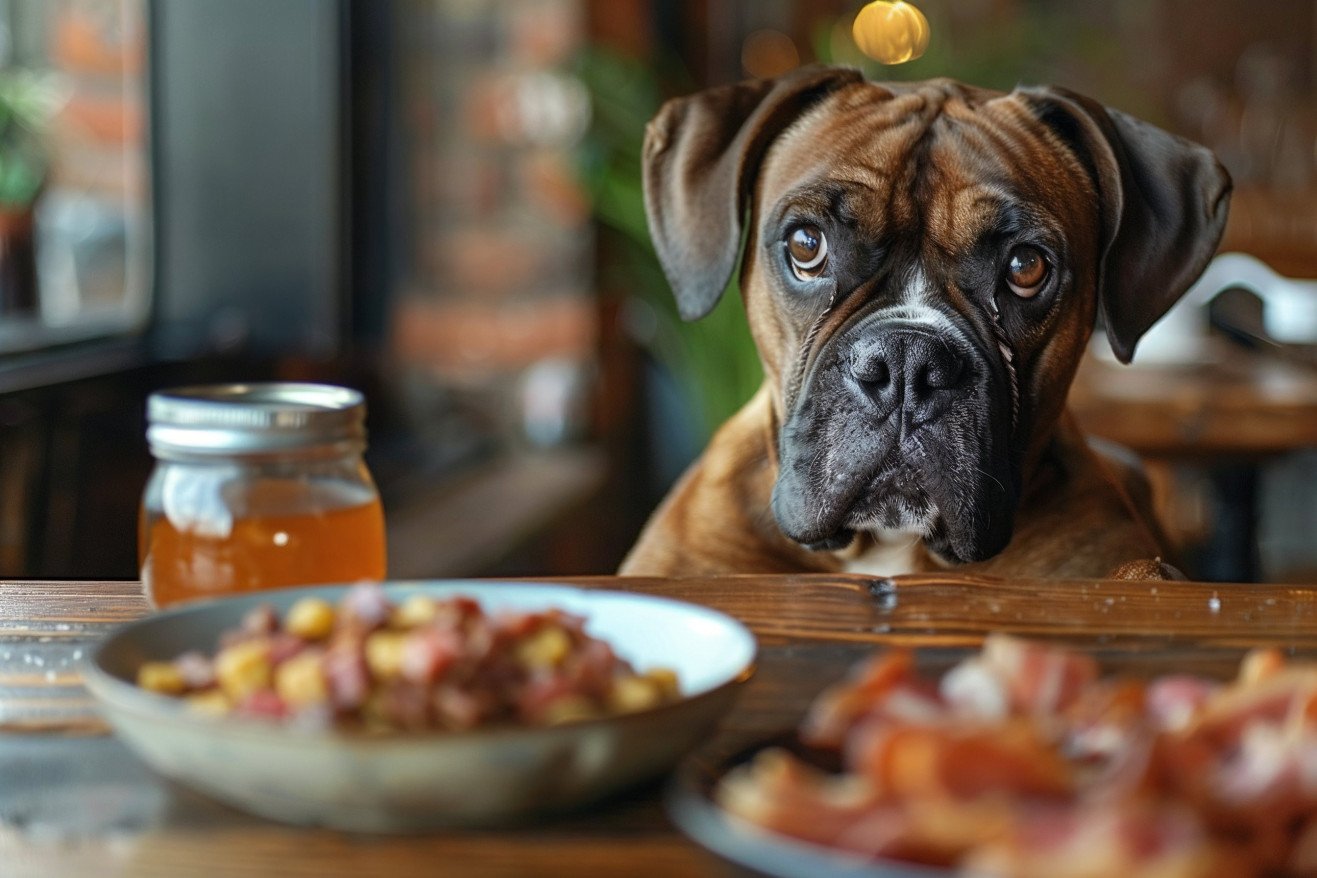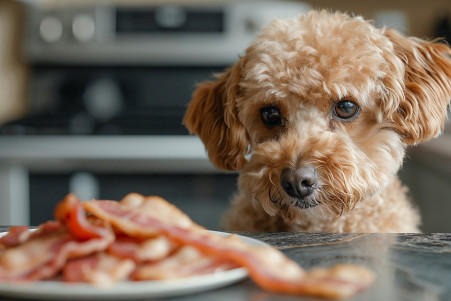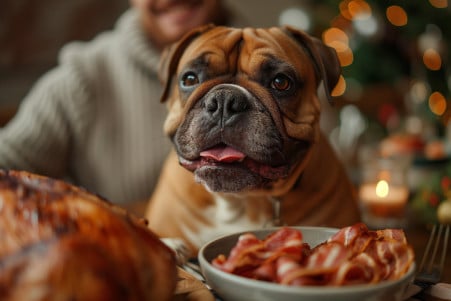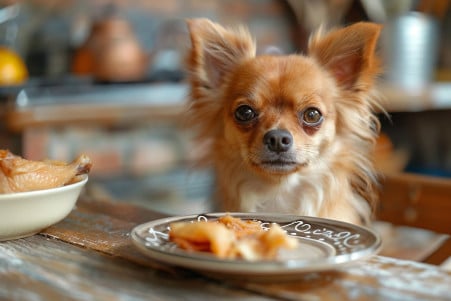Can Dogs Eat Bacon Grease? A Look at the Health Risks
27 February 2024 • Updated 26 February 2024

Your dog may be lured by the delicious smell of bacon grease, but should you let them have a taste? Veterinarians advise against giving dogs bacon grease because it’s high in fat and salt. Consuming bacon grease can cause pancreatitis, obesity, and other problems. To keep your dog healthy, it’s best to steer clear of giving them bacon grease.
In this article, we’ll explore veterinary opinions, animal nutrition research, and health studies to find out what happens when dogs eat bacon grease. We’ll consider a wide range of information, from the science of how dogs’ bodies work to the science of nutrition and the risks of high-fat diets.
With this interdisciplinary research, we hope to offer a well-rounded look at how bacon grease impacts dogs’ health so that you can feel confident about the choices you make for your pet’s diet.
Is bacon grease good for dogs?
Fatty Acids in Your Dog’s Diet
Fats are an important part of a dog’s diet, providing concentrated energy and helping with the absorption of fat-soluble vitamins. VCA Animal Hospitals explains that fats are also important for maintaining healthy skin and coat and providing essential fatty acids that dogs can’t make on their own. PetMD notes that these essential fatty acids include linoleic acid, omega-6, and omega-3 fatty acids.
Although fats are important, not all fats are good for your dog. Bacon grease is full of saturated fats and salt, both of which can be bad for dogs in large amounts. On the other hand, the fats that are good for dogs, including fish oils, flaxseeds, and chicken fat, are high in the essential fatty acids mentioned above.
You can make sure your dog gets the fats they need by adding small amounts of lean, unseasoned, cooked meats or commercial supplements to their diet. These options will provide the necessary fats without the risks associated with bacon grease. Make sure your dog gets the right fats, but keep things in balance to avoid the problems that come with a high-fat diet.
The Dangers of High-Fat Diets in Dogs
High-fat diets, especially those that are high in saturated fats like bacon grease, can have serious metabolic effects on dogs. According to a study by Jörg M. Steiner, which was published on PubMed, high-fat diets are the most common cause of canine hyperlipidemia, which can lead to pancreatitis and obesity. Both of these conditions not only reduce a dog’s quality of life but can also lead to a significantly shorter life.
A study published in Obesity Research by Agatha T. Borne found that high-fat diets also make it harder for dogs to lose weight. Dogs on high-fat diets had a harder time losing body fat and lowering their cholesterol levels than dogs on low-fat diets, which suggests that the fat in bacon grease contributes to unhealthy weight gain and the health problems that come with it.
In addition, a study published in Frontiers in Microbiology by Nick V. L. Serão found that high-fat diets can change the composition of a dog’s gut microbiota, which is important for a dog’s overall health and digestion.
To avoid the dangers of a high-fat diet, dog owners should make sure their dogs’ diets are rich in lean proteins and healthy fats. This can help prevent the metabolic issues that come with a high-fat diet and ensure that dogs are healthier and happier.
How Dogs Process Fats: Canine Physiology
In order to understand why bacon grease is bad for dogs, it’s important to understand how dogs process fats. Fat metabolism is the process by which the body breaks down dietary fats for energy. However, not all fats are created equal.
For example, healthy fats, like omega-3 fatty acids found in fish oils, are easily metabolized and used for energy and cell membrane support. On the other hand, a diet high in saturated fats, like bacon grease, can throw off a dog’s metabolism.
A study in PMC found that unhealthy fat consumption in dogs led to metabolic changes and inflammation that were similar to those seen in human obesity-related disorders. The researchers found that a high-fat diet led to changes in blood glucose and insulin concentrations, which are markers of changes in glucose metabolism.
As a result, feeding dogs a diet high in fats like bacon grease on a regular basis can lead to insulin resistance and a decrease in gut microbiota diversity, both of which are bad for dogs.
This understanding of canine physiology makes it clear that dogs need to be fed fats that will support their health and well-being, while avoiding high-fat options that could lead to health problems like pancreatitis.
How to Identify and Treat Pancreatitis in Dogs
Symptoms like abdominal pain, vomiting, diarrhea, loss of appetite, and dehydration are all signs of pancreatitis in dogs. It’s important to know what to look for, as Bond Vet explains, so that you can catch it early and get your dog the treatment they need. Vets will diagnose pancreatitis based on a combination of a physical exam, blood tests, and imaging like an ultrasound to check enzyme levels and look for inflammation.
According to PetMD, treatment for pancreatitis will often require hospitalization and IV fluids, pain control, nutritional support, and most importantly, a successful transition to a special low-fat diet. If your dog has chronic pancreatitis, they will need to be managed with a combination of medications and dietary changes.
To avoid pancreatitis, WebMD recommends feeding dogs a low-fat, easily digestible diet and keeping them away from high-fat human foods. Regular vet visits and sticking to dietary guidelines can help ensure that your dog doesn’t develop this condition. By being careful about what you feed your dog and keeping up with their care, you can make sure that they stay healthy and avoid the dangers of high-fat foods like bacon grease.
So, Can Dogs Eat Bacon Grease?
In conclusion, after looking at the evidence, it is clear that bacon grease is not a good thing to add to your dog’s diet.
The high fat and salt content of bacon grease is a recipe for disaster when it comes to your dog’s health. Both Hepper and VCA Hospitals point out that bacon grease can lead to pancreatitis and obesity in dogs, both of which are much more serious than the temporary enjoyment that your dog will get from eating it.
It’s important to make sure that your dog is getting the right amount of healthy fats in their diet. As Hot Dog on a Leash explains, lean meats and low-sodium broths are much better options for your dog than bacon grease. These options will help you make sure that your dog is getting the nutrition that they need without overloading them on fat.
It’s important to make sure that you are doing everything that you can to avoid the risks associated with a high-fat diet, especially the risk of pancreatitis—a serious and painful condition. It’s important to make sure that you are feeding your dog in a way that is responsible and that you are following the advice of your vet and doing your own research.
It’s important to make sure that you are making responsible choices when it comes to your dog’s diet. It’s important to make sure that you are working with your vet, following advice that is backed up by research, and making sure that you are giving your dog treats that are good for them. This way, you can make sure that your dog’s diet is helping them live a long and happy life.


